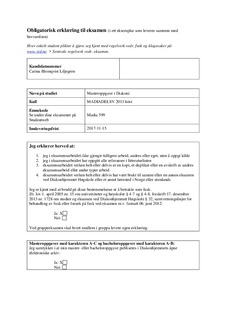| dc.contributor.author | Liljegren, Carina Blomqvist | |
| dc.date.accessioned | 2018-01-10T12:58:40Z | |
| dc.date.available | 2018-01-10T12:58:40Z | |
| dc.date.issued | 2017 | |
| dc.identifier.uri | http://hdl.handle.net/11250/2476786 | |
| dc.description.abstract | This thesis is about how the Franciscans work in the ”Olympic Village” has affected the Roma women. The method is based on the ethnographic tradition of interviews and participatory observations.
The main question in the essay was how the women have been affected by the project`s work since it was started. The result of this study is that the work makes difference for the women. The women are strengthened in their role as mother and wife. They also receive education, health and medical care and slightly higher material standard. Most women did not have the power or willingness to invest in any kind of longer education to get a paid employment. Their family situation with responsibility for home and family was a limitation. In addition, years of oppression and antiziganism have put their marks on them. From an intersectional perspective, the situations of these women are complex. They are under classed within their own family and also because of their Romanian heritage and low status. The theories used to explain this are intersectional, persistent inequality, empowerment and deaconry. | nb_NO |
| dc.language.iso | swe | nb_NO |
| dc.publisher | VID vitenskapelige høgskole. Diakonhjemmet Oslo | nb_NO |
| dc.subject | diakoni | nb_NO |
| dc.subject | empowerment | nb_NO |
| dc.subject | Roma (people) | nb_NO |
| dc.subject | Olympic Village | nb_NO |
| dc.subject | Fransiscans | nb_NO |
| dc.subject | women | nb_NO |
| dc.subject | kvinner | nb_NO |
| dc.subject | Rom (folk) | nb_NO |
| dc.subject | Fransiskushjelpen | nb_NO |
| dc.subject | Romania | nb_NO |
| dc.title | En tid av möten med romska kvinnor i ”Olympic Village i Roman” | nb_NO |
| dc.type | Master thesis | nb_NO |
| dc.source.pagenumber | 65 | nb_NO |
